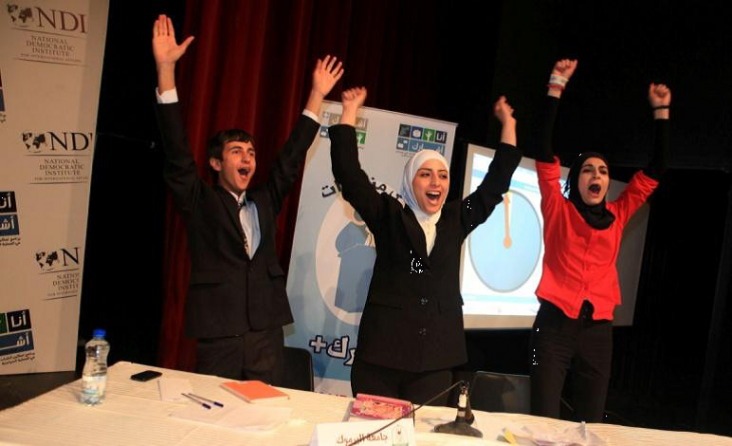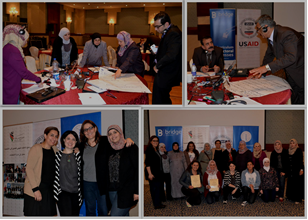Speeches Shim
Background:

In response to citizen demands, Jordan has embarked on a series of reform efforts over the past few years that will ultimately contribute to a more accountable and equitable political process. The 2013 parliamentary election, for example, was conducted based on a new election law to ensure better representation and greater political participation. The law also established the Independent Election Commission (IEC), which is tasked with conducting free and fair elections. However, recent regional developments require Jordan to maintain a balance between achieving reform and maintaining stability. To that end, the USAID Consortium for Elections and Political Process Strengthening (CEPPS) supports the Government of Jordan’s continued efforts toward an equitable and accountable political process to enhance the prosperity and stability of Jordan.
Project overview:
This program aims to strengthen the development of more democratic and open political processes in Jordan. More specifically, it aspires to support the participation of candidates, activists, monitors, and voters in Jordan’s municipal and parliamentary elections. Specific objectives include:
- Improving the ability of civil society organizations (CSOs) to build grassroots demand and effectively advocate for a new legal framework for elections;
- Developing avenues to engage youth substantially in the election process and civic engagement;
- Strengthening political alliances and the ability of candidates to articulate, organize, and implement clear political alternatives at the national and sub-national levels;
- Encouraging issues-based campaigns informed by public opinion research, and the completion of nationwide pre-election and exit polls;
- Bolstering public demand for candidates’ commitment to open and more accountable performance as future members of parliament; and
- Building the capacity of the IEC to conduct transparent and credible election processes.
Activities:
USAID CEPPS:

-
Encourages Jordanian youth to engage politically at universities through debates, political education, and grassroots campaign training;
-
Helps women compete in elections through skill-building seminars, campaign schools, and continued technical support for successful candidates;
-
Conducts campaign skills trainings and workshops on strategy development, organization, media strategies, campaign simulations, and communications and message development;
-
Trains domestic observers on monitoring the voter and candidate registration process, the finalization of voter lists, the electoral campaign period, media conduct during elections, and election day voting and counting procedures; and
-
Builds IEC capacity through training on the internationally recognized “Building Resources in Democracy, Governance and Elections” (BRIDGE) curriculum.
Impact:
So far, CEPPS has:
- Engaged more than 3,000 intellectuals, government officials, activists and youth in conferences to discuss electoral reform recommendations and standards for free and fair elections; established a wide coalition of more than 200 CSOs whose national advocacy campaign improved election procedures;
- Shared public opinion data with youth committees and political parties to support initiatives encouraging party membership;
- Trained partner political parties on internal organization and message delivery which resulted in the creation of parliamentary election committees and improved political marketing;
- Trained female political candidates and female campaign managers on campaign management, volunteer recruitment, and communications and platform development;
- Trained women in impoverished areas on political participation to become leaders in their communities and change the stigmas surrounding female participation in politics;
- Empowered CSO monitors to produce reports giving accurate, credible, critical, and independent review/analysis of the Jordan election and political processes in in order to contribute to improvements in overall performance;
- Engaged more than 7,000 youth in twenty Universities around the Kingdom to discuss and debate democratic concepts and citizen engagement;
- Provided continued training and support to elected women members of parliament and helped establish the first women caucus in the Kingdom; and
- This project has been working to strengthen the local and national capacity to promote good governance since 2010. This means getting the youth to play a supportive role in the election process and participate in civic engagement events. Additionally, the project assists the Government of Jordan in conducting a transparent and credible election process. Recently the project helped devise the legislation for Jordan’s IEC. With their support, Jordan also convened its first-ever Women’s Caucus where hundreds of youth participated and observed. Also, CEPPS installed a fully automated court system, held trainings for more than 700 judges, and supported highly efficient and successful female judges in Jordan. A more inclusive political system in Jordan will lead to more effective governance of its citizens. To that end, the USAID CEPPS supports the Government of Jordan’s continued efforts toward an equitable and accountable political process to enhance the prosperity and stability of Jordan.

Comment
Make a general inquiry or suggest an improvement.